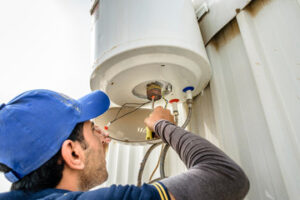Your home’s plumbing drains into a septic tank outside your house. That tank and a network of pipes are the first stage of treatment for wastewater.
The septic tank is a large, underground, watertight container. Solid waste sinks to the bottom, forming sludge, while oil and grease float to the top as scum. The liquid wastewater (effluent) exits the tank and enters a drain or leach field area. Click the https://www.septictankarmadale.com.au/ to learn more.

There are several reasons why septic tanks leak. One reason is that the septic tank is full and needs to be pumped. Another reason is that the baffles are damaged or clogged. The inlet baffle is designed to prevent wastewater from flowing into the tank too quickly, but it can get clogged by toilet paper and other solid waste that people flush down the drains. If the inlet baffle is blocked, it can cause wastewater to stay inside the septic tank longer than necessary and overflow the septic system.
Septic tank leaks can have various causes, but they most often result from poor maintenance, environmental conditions, and structural damage to the septic tank or surrounding components. Calling an experienced professional to repair the problem and avoid further damage and septic tank failure is always a good idea.
A strong sewage smell is one of the most common signs of septic tank leaks. While this may not be the most pleasant thing to experience, it is a clear sign that the tank is not working as it should and may need to be pumped.
Other signs of septic tank leaks include standing water around the home. This is especially dangerous in wet weather and could mean that sewage is seeping into the ground and contaminating it. In some cases, septic tank leaks can even flow into the home, potentially causing health and safety issues for those who live there.
There are a variety of ways to diagnose and fix septic tank leaks, but the first step is usually to call in an expert to empty the septic tank. This will give the septic tank technician a chance to determine what is causing the leak and how it can be fixed before the situation gets worse.
If you suspect that your septic tank is leaking, contact the experts at Garden Master Waste Water Solutions. We provide septic tank service and maintenance, as well as new septic tank installation throughout NSW and Victoria. Contact us today for more information or to schedule an appointment.
Increased Bug Activity
Often, the dark, damp environment of a septic tank attracts pests such as rodents and insects. This is particularly true if the septic tank has cracks and other damage. Pests are drawn to the area because it provides a safe and quiet place for them to nest and breed. Moreover, the rotting organic waste can attract flies, ants, and beetles that feed on it.
The way a septic system works is that waste liquids flow through pipes into the septic tank where it settles and the solid waste, called sludge, rises to the top of the tank. The septic tank is equipped with an inlet and outlet baffle to prevent the separated solid waste from leaving the septic system and clogging the absorption field. The septic tank is also filled with bacteria that break down the solid waste through anaerobic digestion.
These processes help to ensure that the septic system does not overflow and cause wastewater to back up into the house. However, the septic tank does not remove all solid waste and if too much material goes into the septic tank, it may overflow and drain into the absorption field, where the un-decomposed materials can clog the leach fields, decrease soil porosity, and create backups in toilets and sinks.
To minimize the amount of solids that enter the septic tank, homeowners should only flush body waste, toilet paper, and human hair. Household bleaches and other chemical products can destroy the microbial population in the septic tank, slowing down decomposition, and should never be poured down the drain. Instead, a tablet of BIOBOOSTER 1T(tm) can be used to replenish the microbial population in the septic system.
Additionally, if the septic tank is not pumped regularly, the organic matter will rot and attract pests, such as flies, beetles, and mice. This can also contribute to the offensive odors of a septic tank. If the septic tank is not pumped frequently, it may also become acidic. This will kill the normal bacteria and result in offensive odours that can be remedied with hydrated lime, available from hardware stores.
Burps in the Drains
A gurgling sound from your sink or toilet is usually the first indication that your septic system may be in need of service. This is because the plumbing drains that are directly connected to your septic tank might be clogged or developing a clog. This will cause the septic system to overflow, which can back up sewage into your house’s plumbing fixtures.
One of the most common causes for this is when your home’s inlet baffle to the septic tank is blocked by solid waste like toilet paper, coffee grounds, grease, and other household garbage. You can prevent this by only flushing human waste and toilet paper, and having your septic system inspected annually.
Another problem that might lead to gurgling from your drains is when the drain field fails or becomes waterlogged. If this happens, the microbes inside your septic tank won’t be able to break down waste solids. When they can’t do their job, the pH level in the septic tank will become too acidic and produce a foul odor.
You can avoid this by limiting the amount of water you use, washing clothes only a few times per week, and planting grass around your drain field to help insulate it from rain and snow melt. You can also reduce the amount of waste that goes into your septic system by only flushing organic materials down your toilets, and by adding a cup of baking soda to your toilet once a week to keep the pH level in your septic tank normal.
Finally, it’s essential to have your septic tank pumped every three to five years to avoid overflow. If you don’t have your septic tank pumped regularly, the microbes in it will die and the overflow will back up into your plumbing drains. This will eventually contaminate groundwater and sewage, causing health problems for your family. To avoid this, have your septic tank pumped when it’s close to full. The EPA recommends checking the tank and baffles, checking that all vents are clear, and having the drain field inspected if it’s been more than a few years since your last pumping.
Weed Growth
When a homeowner’s septic tank is properly balanced, solid waste sinks to the bottom of the tank and bacteria digest it. Liquid wastewater (effluent) rises to the top of the tank. When there is too much indigestible solids, it can clog the absorption field piping and reduce soil porosity, which leads to costly repairs.
The solution is to have a professional company that provides septic tank pumping regularly inspect and clean the septic system. This helps to prevent septic tanks from becoming overloaded with waste, which can lead to sewage overflow into the absorption field and into the home. It also helps to prevent the buildup of solids, which can block the pipes that carry the wastewater from your home into the septic tank.
Your septic tank contains all of the waste from household plumbing. This includes liquids, such as washing machines and toilets, and solids, such as food scraps and sanitary items. The solids settle to the bottom of the septic tank, where they decompose into a sludge. The liquids float to the top of the septic tank, where they form a scum layer. When the sludge and scum levels get too high, they can overflow into the absorption field, where they contaminate the ground water with disease-causing organisms from contaminated sewage.
To help keep septic tank sludge and scum levels low, it’s important to have your septic tank pumped every few years by a company that provides septic services. In addition, homeowners can use biological additives to boost the number of bacteria in the septic tank and speed up the process of decomposition.
When your septic tank is filled with wastewater, it discharges into the drain field, which is usually located in the corner of your yard. The wastewater flows through a series of pipes in gravel-filled trenches, where it gets further filtered and purified by the soil. The goal of the septic tank and the drain field is to remove all of the contaminants, bacteria, and viruses from the wastewater so that it is safe for drinking. In order to protect your septic tank and absorption field, it is important to plant grass and other shallow-rooted plants over the area and to limit the amount of organic debris that enters the soil.


